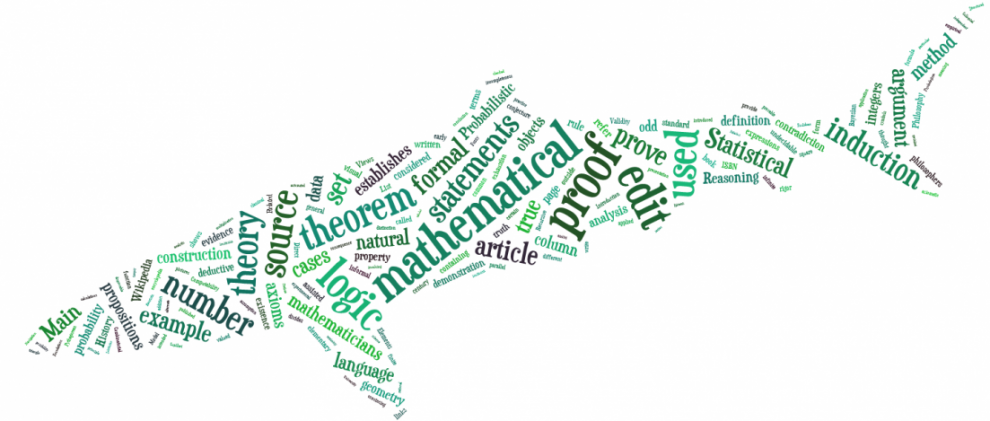Description: The course is designed to prepare students for an advanced mathematics curriculum by providing a transition from Calculus to abstract mathematics. The course focuses on the processes of mathematical reasoning, argument, and discovery. Topics include propositional and first order logic, learning proofs through puzzles and games, axiomatic approach to group theory, number theory, and set theory, abstract properties of relations and functions, elementary graph theory, sets of different cardinalities, and the construction and properties of real numbers.
Course and Section: Math 2070 Introduction to Proofs and Logic, Section 6640
Class Meets: T/Th 10:00 – 11:15, N1004
Book: Hammack, R. (2009). Book of Proof. Edition 1.3 (or Edition 2). Creative Commons Attribution – No Derivative Works 3.0. Available on Amazon (around $14), or download for free at the author’s website: http://www.people.vcu.edu/~rhammack/BookOfProof/ .
Office: Namm N707
Office Hours: Th 11:15-1:15
Email: jreitz (at) citytech . cuny . edu
OpenLab: The class website will be on the OpenLab (openlab.citytech.cuny.edu). The site contains important information about the course, and will be used in various ways throughout the semester. The address for the class website is:
https://openlab.citytech.cuny.edu/2013-fall-mat-2070-reitz/
WeBWorK: Some of the homework for this class will be completed on the WeBWorK website. You will be provided with more information in the first week of class. The address is: http://mathww.citytech.cuny.edu/webwork2/MAT2070/
Grading (percent / letter grade correspondence):
A = 93.0 — 100
A- = 90.0 — 92.9
B+ = 87.0 — 89.9
B = 83.0 — 86.9
B- = 80.0 — 82.9
C+ = 77.0 — 79.9
C = 70.0 — 76.9
D = 60.0 — 69.9
F = 0 — 59.9
W = withdrawal up to 11/7/13
WF = withdrawal after 11/7/13 (WF = F)
NOTE: Withdraw before 11/7/13 to avoid an F or WF
Grading (how your grade is calculated):
Homework (25%): Each week you will be assigned a combination of online homework (to be completed on the WeBWorK site) and written homework (to be completed and handed in on paper). All problems completed will earn points towards your homework grade. Over the course of the semester, you will only need to complete 80% of the assigned problems to earn the required points. Any additional points earned will count as bonus credit (50% value of required points).
OpenLab participation (10%): You will be participating in the OpenLab (website) by posting and making comments in response to assigned readings, homework problems, and so on. Your first assignment is to register for the OpenLab and join this class (go to the course website for instructions). Further assignments will be posted on the OpenLab, approximately every 2 weeks.
In-Class Exams (40%): There will be 3 exams during the semester (not including the final). No makeup exams will be given. If you miss an exam for a valid reason, your final exam score will take the place of the missing exam.
Final Exam (25%): A final exam is given on the last day of class covering all topics. The final exam must be taken to pass the course.
Attendance: Absence is permitted only with a valid reason. Anything in excess of 10% of the total number of class meetings is considered excessive absence (more than 3 absences).
Lateness: Two latenesses count as one absence.
Records: Records should be kept by every student of all grades received, exam papers, other work completed and any absences.
Learning Outcomes
-
Students will be able to evaluate truth of statements in propositional and first order logic.
-
Students will be able to understand and use formal reasoning methods.
-
Students will be able to recognize the role of sets in mathematics.
Gen Ed Learning Outcomes
Students will be able to:
-
Make meaningful and multiple connections between mathematics and other areas of study.
-
Employ scientific reasoning and logical thinking.
-
Use creativity to solve problems.
-
Communicate effectively using written and oral means.
Academic Integrity: The New York City College of Technology Policy on Academic Integrity: Students and all others who work with information, ideas, texts, images, music, inventions, and other intellectual property owe their audience and sources accuracy and honesty in using, crediting, and citing sources. As a community of intellectual and professional workers, the College recognizes its responsibility for providing instruction in information literacy and academic integrity, offering models of good practice, and responding vigilantly and appropriately to infractions of academic integrity. Accordingly, academic dishonesty is prohibited in The City University of New York and at New York City College of Technology and is punishable by penalties, including failing grades, suspension, and expulsion. The complete text of the College policy on Academic Integrity may be found on p. 64 of the catalog.



